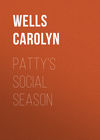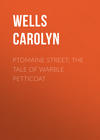Читать книгу: «Marjorie's Maytime», страница 9
CHAPTER XVII
LITTLE VIVIAN
It was about ten minutes later when Pompton and his three charges came out of the circus tent. There was a great crowd, and not seeing Marjorie at first, Pompton waited until most of the people had gone away, and then began to look around for her.
"I know she wouldn't go very far away," said King. "She must be quite near here."
"I'm not so sure," said Kitty. "You know how Marjorie runs off if she chooses, without thinking of other people."
"I'm greatly worried, Master King," said Pompton. "I suppose I ought not to have let the child come out here alone. But she was so anxious to come, and she promised she'd stay right here by the door. I couldn't come with her, and look after the rest of you at the same time now, could I?"
"Of course you couldn't, Pompton," said Kitty. "You did quite right. And I don't believe Marjorie is very far away; I think she'll be back in a minute or two."
But they waited several minutes, and the people who had been in the circus tent all went away. The grounds about were entirely cleared, and save for a few workmen, there was no one in sight. Uncertain what to do, Pompton appealed to the doorman, who just then came out with his hands full of tickets.
"Do you know anything about a little girl, about twelve years old, who came out of the tent a short time ago?" asked Pompton.
"Naw," returned the man, curtly, paying little attention to the inquiry.
"But you must have seen her come out," said King. "She came out alone, before the performance was over. She had on a long tan-colored coat."
"Aw, that kid? Yes, I seen her, but I don't know where she went to."
"But we must find her! She's my sister!" said Kitty, and the tears came into her eyes.
The doorman looked at Pompton. "You ought to keep yer kids together, an' not let yer party get sep'rated."
"It wasn't Pompton's fault at all!" cried King, indignantly. "My sister came out here to wait for us, and of course she's around here somewhere. She must be in one of the tents. May we go and look for her?"
"Sure! Go where you like. I s'pose she's pokin' around somewhere to see what's goin' on."
"Of course she's in one of the tents," said Kitty, brightening at the idea. "Where shall we look first, King?"
Just then the man named Bill came along.
"Hello, youngsters," he said. "Lookin' fer that kid sister of yours? She told me to tell you where she'd gone, but, bless my soul, I forgot all about it!"
"Oh, where is she?" cried Kitty, clasping her hands, and looking up at Bill with pleading eyes.
"There, there, little one! There ain't no use gettin' weepy about it.
Sister's all right. She just went in that there tent with Mademoiselle Cora."
Bill pointed to the tent, and King and Kitty made a dash for it.
They fairly burst in at the door, and sure enough, there was Marjorie sitting on a big packing box, watching a little girl who was performing most remarkable athletic feats.
"Oh, hello," cried Marjorie, "I'm so glad you've come! Just sit down here beside me, and watch Vivian. Mademoiselle Cora, this is my brother and sister."
King pulled off his cap, and felt a little uncertain as to what sort of etiquette this very strange situation demanded. But he bowed politely, and as Mademoiselle Cora smiled, and asked the two newcomers to be seated, and as there were plenty of packing boxes, King and Kitty sat down.
"This is Vivian," said Marjorie, waving her hand toward the little acrobat, who was turning double somersaults with lightning rapidity. "She's only twelve, isn't she wonderful?"
The experience was so novel, it is scarcely to be wondered at that King and Kitty fell under the spell, as Marjorie had done, and the three sat breathlessly watching Vivian.
Mademoiselle Cora smiled at the enraptured audience, and in a far corner of the tent sat a placid-looking woman knitting a shawl. This was the mother of the two girls, but she took little interest in the visitors, and except for an occasional glance at them, devoted herself to her knitting.
After waiting a few moments, and seeing that the children did not reappear, Pompton decided to go into the tent himself. He hesitated about taking Rosamond in, but there was no help for it, so carrying the child in his arms, he pushed aside the canvas flap which formed the tent door, and stepped inside.
"My word!" he exclaimed, as he saw the youthful performer, and the interested audience. "You children are the most surprising! I think you had better come away now."
"I think so, too," remarked Vivian's mother, looking up for a moment from her knitting. "Are there many more of you to come?"
"Now don't be uncivil, Mother," said Cora, with her pretty smile. "It does no harm for these children to see Vivian perform. You know she wasn't on the programme to-day."
"I'm only a beginner," said Vivian, standing on her feet once more, and speaking to Marjorie and Kitty. "I've had quite a good deal of training, and now I'm on the programme afternoons twice a week. Next year I'll be on every afternoon."
"Do you like it?" asked Kitty, fascinated by this strange child. Vivian was a pretty little girl, and she wore a garment of pink muslin, shaped like children's rompers. She wore pink stockings and pink kid sandals, and her golden hair was short, and curled all over her little head.
"Yes, I like it," replied Vivian, but a wistful look came into her blue eyes. Gently, almost timidly, she touched Marjorie's pretty coat and straw hat with her slender little fingers. "I like it,—but I think I'd rather be a little home-girl like you."
"Cora, send those children away," said the mother, sharply. "They upset Vivian completely when she sees them."
"I like to see them," said Vivian, and she sat down between Kitty and Midget. "I like to see your pretty dresses, and real shoes and stockings.
Do you go to school?"
Marjorie felt strangely drawn to this little girl who seemed so to want the privacy of a home life. She spoke to her very gently. "Yes, Vivian, we all go to school,—though I don't go to a regular school, do you?"
"No, I don't. Mother and Cora say they'll teach me every day, while we're on the road, but they never get time. And I have to practise a great deal."
Marjorie looked around for a piano, and then suddenly realized that Vivian meant she must practise her gymnastic exercises.
"Come, Miss Marjorie, we must be going," said Pompton, who felt moved himself by the pathetic face of the little circus girl.
"Well, perhaps you'd better go now," said Cora, who had received imperative glances from her mother. "But we've enjoyed seeing you, and we thank you for your call."
Mademoiselle Cora had very polite manners, but she seemed to be under the rule of her mother, and it was with evident reluctance that she bade the visitors good-bye.
"I'll give you my picture," said Vivian to Marjorie, as they parted, "because I want you to remember me. I would like to have your picture, but Mother won't let me have little girls' photographs. She thinks it makes me feel envious to see pictures of little home-girls."
"Well, I'll give you something to remember me by," said Marjorie, impulsively, and she took from her neck a string of blue beads, and clasped it round Vivian's throat.
"Oh, thank you," said Vivian, with sparkling eyes. "I shall wear them always, and love them because you gave them to me. Good-bye, dear, dear little home-girl!"
The tears came into Marjorie's eyes at the tremor in Vivian's voice, and she kissed her affectionately, and then bidding good-bye to Mademoiselle Cora they followed Pompton out of the tent.
They were all rather silent as they trudged along to the trolley-car, and then Kitty said slowly, "Isn't it awful to be like that? I suppose she never has any home-life at all."
"Of course she hasn't, Miss Kitty, as she has no home," said Pompton; "it's wicked to put a child like that in a circus, it certainly is! She's a sweet little girl, and her sister is a fine young lady, too."
"The mother is horrid," said King. "She was awful cross about our being there."
"Well," said Kitty, who sometimes saw deeper than the rest, "you mustn't blame her too much. Couldn't you see she didn't want us there, because just the sight of happy home-children makes little Vivian feel sorry that she has to live in a circus?"
"Yes, that was it," said Marjorie. "I suppose they haven't any other way to earn their living."
The children could scarcely wait to get home to tell their parents of this wonderful experience.
They found Mr. and Mrs. Maynard waiting for them at the hotel, and wondering a little because they were late.
"Oh," cried Marjorie, flinging herself into her mother's arms, "we've had a most 'stonishing time! We visited a little circus girl in her own tent, and here's her picture!"
Marjorie held up to her mother's amazed view the picture of little Vivian. It was taken in stage costume, and represented Vivian in one of her clever acrobatic feats. Her pretty child-face wore a sweet smile, and the whole effect of the photograph was dainty and graceful. Across a corner was scrawled the word "Vivian" in large, childish letters.
"Did you buy this?" asked Mrs. Maynard, knowing that circus performers often sold their photographs.
"Oh, no, indeed, Mother; she gave it to me. And what do you think, Mother? The poor little thing has to live in a tent, and she wants to live in a home! And it made her awful sad to see us, 'cause we have a home, and we can wear regular dresses and shoes, and she has to wear queer bloomer things,—and sandals on her feet!"
"But I don't understand, Marjorie," said Mrs. Maynard. "How do you know all this? Did you talk with the child?"
"Oh, yes, Mother; we went in her tent, and saw her mother and sister. I don't think they mind being in the circus so much. But Vivian feels just awful about it! And she's such a sweet little thing; and, Mother, I have the loveliest plan! Don't you think it would be nice for us to 'dopt her, and let her live with us?"
"Midget, what are you talking about?" and Mrs. Maynard's face showed so plainly her dissent to the proposition that Marjorie jumped out of her lap, and ran across to her father, in the hope of better success.
"Now, Father," she said as she threw her arms around his neck, and drew his arms around her; "do please pay 'tention to my plan! You know we ought to do some good in this world, and what could be better than rescuing a poor little sad circus girl, and letting her live in our own happy home with us? It wouldn't cost much,—she could have half of my clothes, and half of Kitty's,—we could each get along with half, I know. And we could both eat less,—that is, I could,—I don't know about Kit. But anyway, Father, won't you think about it?"
"Yes, dear," said Mr. Maynard, looking fondly at his impetuous daughter; "I'll think about it right now,—and I'll express my thoughts aloud, as I think them. I think, first, that you're a generous and kind-hearted little girl to want to give this poor child a home. And I think next, that having made your suggestion, you must leave it to Mother and me to decide the matter. And our decision is that four children are quite enough for this family, and we don't want to adopt any more! Besides this, Marjorie, it is far from likely that the little girl would be allowed to come to us. She is being trained for her profession, and though I feel sorry that the child is not happy, yet she is with her own people, and they are responsible for the shaping of her life and career. Just now, you are carried away by sympathy for the little girl, and I don't blame you at all, for it is a sad case. But you must trust your father's judgment, when he tells you that he does not think it wise to follow out your suggestion."
Marjorie looked disappointed, but she well knew that when her father talked thus seriously, there was no use in pursuing the subject; so she only said, "All right, Father; I know you know best. But it does seem too bad for Vivian not to have any home pleasures, when I have so many!"
"It does seem too bad, Marjorie, but since you can't help her in any way, turn your thoughts to feeling glad and grateful that you yourself have a happy home, and can wear button boots."
Marjorie laughed at her father's last words, but she knew that "button boots" stood for the civilized dress of the home-child, as contrasted with the stage trappings of the little Vivian.
So she put the photograph away among her treasures, and often looked at it, and wondered if Vivian still longed for the sort of happy home-life that meant so much to Marjorie.
CHAPTER XVIII
IN BOSTON
The next day the Maynards started for Boston. That is, their destination was Boston, but Mr. and Mrs. Maynard had decided to go by very short stages, and stop several times on the way.
And so they spent one night at New London, two or three more at Newport and Narragansett Pier, and so on to Boston.
It was too early in the season for the summer crowds at the watering places, but though the gay life was absent, they enjoyed their stay at each place.
It was all so novel to the children that the days passed like a swiftly moving panorama, and they went from one scene to another, always sure of experiencing some new pleasure.
* * * * *
One warm and pleasant afternoon the big car swung into Boston, and deposited its occupants at a pleasant hotel on a broad and beautiful avenue.
As Mr. Maynard registered at the office, the clerk handed him a budget of mail. It was not unusual for him to find letters awaiting him at the various hotels, but this time there were also four post-cards for the children.
"Who can have written to us?" exclaimed Marjorie, as she took hers. "I don't know this hand-writing; I'm sure I never saw it before."
She turned the card over, and saw a picture of the State House, one of Boston's principal places of interest. Beneath the picture was written:
"Please come and visit me;
I am the place you want to see."
"How funny," said Marjorie. "Who could have sent it? Is it an advertisement, Father?"
"No, Midget, The State House doesn't have to advertise itself! What is yours, King?"
"Mine is a picture of the Public Library, and this has a verse under it, too. It says:
"How do you think you like my looks?
Beautiful pictures and wonderful books!"
"These are lots of fun, whoever sent them," said Kitty. "Listen to mine.
It's a picture of Faneuil Hall. Under it is written:
"Do not think you have seen all
Until you have visited Faneuil Hall!"
"And Rosy Posy has one, too," said Marjorie. "Let sister read it, dear."
"Yes, Middy wead my post-card," and the baby handed it over.
"This is a lovely one," said Marjorie. "See, it's all bright-colored flowers, and it says:
"The Boston Common's bright and gay,
With tulips in a brave array."
"Sure enough," said Mrs. Maynard, "the tulips must be in bloom now, and to-morrow we must go to see them."
"Oh, what lovely times we are having!" cried Marjorie. "How long are we going to stay in Boston, Father?"
"Long enough, at any rate, to see all these sights suggested by your post-cards. And I may as well tell you, children, that the cards were sent by Mr. Bryant, a friend of mine in Cambridge; and we are going to visit at his house when we leave here."
"Have we ever seen him?" asked Marjorie.
"Only when you were very small children; not since you can remember. But they are delightful people, and indeed are distant cousins of your mother. I can assure you you'll have a good time at their home."
"We seem to have good times everywhere," said Marjorie, with a happy little sigh of content. "This has been the most beautiful May ever was! And a real Maynard May, because we've all been together all the time!"
"May for the Maynards, and the Maynards for May," sang King, and they all repeated the line, which was one of their favorite mottoes.
"Maytime is a lovely time, anyway, isn't it, Father?" said Marjorie.
"Yes, unless it rains," Mr. Maynard replied, smiling.
"Well, we've had awful little rain since we started," commented Marjorie; "just a little shower now and then, and that's all."
"Maytime is playtime for us this year, sure enough," said her father; "I hope you children realize that these are all Ourdays, and you're piling up enough of them to last for two or three years ahead."
"Oh, they don't count that way, do they?" cried Kitty, in such dismay that her father laughed.
"Don't worry, Kitsie," he said. "I guess we can squeeze out a few Ourdays in the future. Meantime, enjoy your Maytime while you may."
And this the Maynard family proceeded to do. They spent several days in Boston, seeing the sights of the town, and making little excursions to the suburbs and nearby places of interest.
They visited the Public Library, and studied the wonderful paintings there. They went to the State House, and Faneuil Hall, and Mr. Maynard showed the children so many interesting relics, and taught them so much interesting New England history that Marjorie declared he was quite as good a teacher as Miss Hart.
They spent much time in the Public Gardens and on the Common, for the Maynard children dearly loved to be out of doors, and the flowers in their masses of bloom were enchanting.
Indeed, there was so much of interest to see that Marjorie felt almost sorry when the time came to go to Cambridge for their visit at Mr. and Mrs. Bryant's. But her father told her that on their return from Cambridge they could, if they wished, spend a few more days in Boston.
And so, one afternoon, the Maynards drove away from the hotel in their car, and crossed the Charles River to Cambridge.
The Bryants' home was a fine, large estate not far from Harvard College.
"Another college!" exclaimed Marjorie, as they passed the University Buildings. "Can we go through this one, Father, as we did through Yale?"
"Yes," said Mr. Maynard, "and then King can make a choice of which he wants to attend."
"I think I know already," returned King; "but I won't tell you yet, for I may change my mind."
As they turned in at the gateway of the Bryants' home they found themselves on a long avenue, bordered with magnificent trees. This led to the house, and on the veranda their host and hostess stood awaiting them.
"You dear people! I'm so glad to see you; jump right out, and come in," exclaimed Mrs. Bryant, as the car stopped. She was a pretty, vivacious little lady, with cordial hospitality beaming from her gray eyes, and Mr. Bryant, a tall, dark-haired man, was no less enthusiastic in his greetings.
"Hello, Ed," he cried. "Mighty glad to see you here! Hope we can give you a good time! I know we can make it pleasant for you grownups, but it's the kiddies I'm thinking about. I told Ethel she must just devote herself to their entertainment all the time they're here. She's laid in a lot of playthings for them, and they must just consider that the house is their own, and they can do whatever they like from attic to cellar! How many? Four? That's what I thought. I don't know their names, but I'll learn them later. Here, jump up, Peter, Susan, Mehitabel,—or whatever your names are,—and let me see how you look!"
As jovial Mr. Bryant had been talking, he had lifted the children from the car. He paid little attention to them individually, seeming to think they were mere infants.
Mrs. Bryant was chatting away at the same time. "Is this Marjorie?" she said. "My, what a big girl! When I last saw her she was only six or seven. And Kingdon,—almost a young man, I declare! Kitty, I remember,—but this little chunk of sweetness I never saw before!"
She picked up Rosy Posy in her arms, and the little one smiled and patted her cheek, for Mrs. Bryant had a taking way with children, and they always loved her.
Marjorie couldn't help thinking what a contrast this greeting was to their reception at Grandma Maynard's, but she also realized that the Bryants were much younger people, and apparently were very fond of children.
Altogether, it was a most satisfactory welcome, and the Maynards trooped into the house, with that comfortable feeling always bestowed by a warm reception.
"Now, I'll take you girlies upstairs," Mrs. Bryant chatted on, taking Marjorie and Kitty each by a hand; "and I'll brush your hair and wash your paddies, and fix you up all nice for supper."
Marjorie couldn't help laughing at this.
"Don't let us make you too much trouble, Mrs. Bryant," she said. "You know we're quite big girls, and we tie each other's ribbons."
"Bless me! Is that so? But you musn't call me Mrs. Bryant! I'm Cousin Ethel, and Mr. Bryant is Cousin Jack, and if you call us anything more formal than that, we'll feel terribly offended!"
And then Cousin Ethel bustled away to look after her other guests, leaving Midget and Kitty to take care of themselves.
She had given them a delightful room, large and sunshiny, with a sort of a tower bay-window on one corner. The carpet was sprinkled with little rosebuds, and the wall-paper matched it. Some of the chairs and the couch were covered with chintz, and that, too, had little rosebuds all over it. The curtains at the windows were of frilled white muslin, and the dressing table had all sorts of dainty and pretty appointments. There were twin brass beds, and on the foot of each was a fluffy, rolled coverlet, with more pink rosebuds.
"What a darling room!" exclaimed Marjorie, as she looked around. "Oh, Kit, isn't it pretty?"
"Lovely!" agreed Kitty. "And Cousin Ethel is a darling, too. I love her already! We're going to have a beautiful time here, Mops."
"Yes, indeedy! I wish we were going to stay all summer. Kit, this is a perfect May room, isn't it?"
"Yes, it's so flowery and bright. What are we going to wear, Mops?"
"White dresses, I s'pose. Our trunk is here, you see."
"And let's wear our Dresden sashes and ribbons,—then we'll match this rosebuddy room."
And so when Cousin Ethel returned to her young guests, she found them all spick and span, in their dainty white frocks and pretty ribbons.
"Bless your sweet hearts!" she cried, kissing them both. "You look like Spring Beauties! Come on downstairs with me."
She put an arm around each of the girls, and they all went down the broad staircase. In the hall below they met Cousin Jack, who looked at them with an expression of disappointment on his face.
"Well!" he said. "Well, Susan and Mehitabel,—I'm surprised at you!"
"What's the matter?" asked Marjorie, who could not imagine what Cousin Jack meant. Kitty, too, looked disturbed, for since Cousin Ethel had approved of their pretty dresses, she could not think what Cousin Jack was criticising.
"The idea," he went on, "of you girls coming down dressed like that!"
"What do you mean, Jack?" asked his wife, "I'm sure these darlings look lovely."
"Yes, they do," and Mr. Bryant's tone was distinctly aggrieved; "but, you see, I thought we'd play Indians,—and who could play Indians with such dressed-up poppets as these?"
Cousin Ethel laughed. "Oh, that's all right," she said. "Of course you can't play Indians to-night, but you can play it all day to-morrow. And now, I think supper is ready. We usually have dinner at night, but we're having supper on account of you children."
"You're awfully good to us, Cousin Ethel," said Marjorie, appreciatively.
"We do sit up to dinner at home, unless there are guests."
"Well, I'll see that you get enough to eat, whether it's supper or dinner," Cousin Jack assured them, and then, the others having arrived, they all went to the dining-room.
The supper, besides being substantial and satisfying, seemed to include almost everything that appealed to the children's tastes; and when at last the ice cream appeared, Kitty's look of supreme content convinced Cousin Ethel that the meal had been wisely ordered.
After supper they all went into the large living room, and Cousin Jack proceeded to entertain them.
"At what time do you have to go to bed, Mehitabel?" he asked of Marjorie, whom, for no reason at all, he persisted in calling by that ridiculous name.
"They must go by nine o'clock," said Mrs. Maynard, answering the question herself. "The three older ones may sit up until then."
"All right, Madam Maynard; then I shall devote my attention to the three until their bedtime, after which I may be able to chat a little while with you and Ed."
Cousin Jack was as good as his word, and entertained the children zealously until nine o'clock. He arranged a magic lantern show, and as the pictures were very funny, and Cousin Jack's description of them funnier still, the young Maynards were kept in peals of laughter, in which the older part of the audience often joined.
After this, he let them listen to a large talking-machine, and as many of the records were humorous songs or comical dialogues, there was more laughter and hilarity.
Nine o'clock came all too soon, and the children trooped off to bed, regretfully.
"Shoo!" cried Cousin Jack, as the clock struck, "shoo, every one of you!
Scamper, Mehitabel! Fly, Susannah! And hustle, Hezekiah!"
With Cousin Jack clapping his hands and issuing his peremptory orders, the children ran laughing away, and scurried upstairs.
"Did you ever see such ducky people?" said King, as he lingered in the upper hall a minute with his sisters.
"They're perfectly beautiful!" said Marjorie. "And I can hardly wait for to-morrow to come to see what Cousin Jack will do next."
"Let's go to bed," said practical Kitty, "and that'll make to-morrow come quicker. Good-night, King."
"Good-night, Kit; good-night, Mopsy," and with an affectionate tweak of his sisters' curls. King went away to his own room, and the girls to theirs.
Покупайте книги и получайте бонусы в Литрес, Читай-городе и Буквоеде.
Участвовать в бонусной программе




















